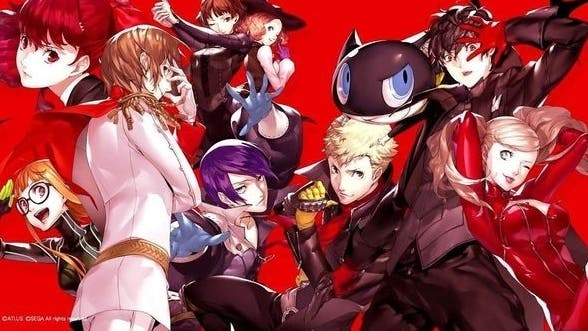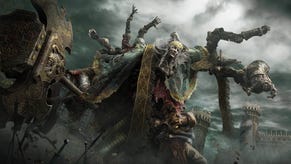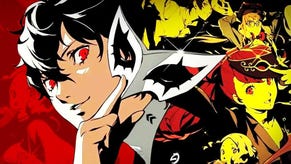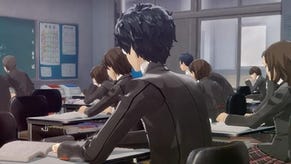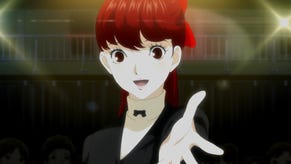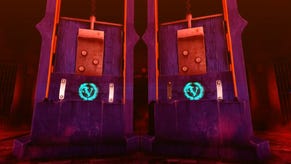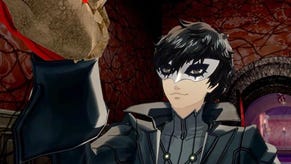Persona 5 Royal review - both better and worse than the original
Joker's on you.
It's a great intro: protagonist Joker darting along the casino roof, quick like a shadow. Making fast work of a handful of enemies while leaving others in the dust, his black coat swishing behind him. The excited voices of his team mates over the intercom as he's almost reached his goal, but then! Curse your sudden but inevitable betrayal! He's surrounded!
The first sequence of Persona 5 Royal acts as foreshadowing and tutorial all wrapped up in one, showing you everything you will regularly be doing in each dungeon you crawl through - jumping between platforms and squeezing through ducts to find a way forward, hiding away from enemies or ambushing them when they're not looking. Most importantly, in round-based combat you unleash Persona, manifestations of parts of Joker's psyche who can use different elemental attacks, healing spells and stat buffs. Persona 5 Royal also adds a grappling hook to your arsenal, which you'll mostly use to find shortcuts and additional treasure.
Joker and his friends, regular students at Shujin Academy in Tokyo, one day stumble into the Metaverse, a parallel reality that manifests Palaces where people live out their worst desires. There's also Mementos, a sprawling maze of randomly generated dungeons. The group of high schoolers enter these palaces to steal people's treasures, causing them to let go of harmful desires and confess their crimes.
Persona 5 Royal brands itself as the definitive version of the game, and introduces an extensive list of improvements - if you've played Persona 5 before, you'll definitely notice how P-Studio worked to fix a few common gripes. New items help in combat, such as talismans that buff several stats at once, more food and drink that replenishes SP and many new accessories, among them rings you can put on your team members so they can use spells they normally don't have access to.
You can form bonds with two new characters, first-year gymnast Kasumi Yoshizawa and school counsellor Takuto Maruki. Scenes with both are sprinkled in throughout the main story, while an all-new storyline after the main game focuses completely on them. New bonds mean there's new Persona to catch and new abilities to gain from becoming friends, too.
Speaking of abilities - Persona 5 Royal introduces a really cool new special attack that unlocks as the story progresses. Called Showtime, it's a powerful attack that unlocks when an enemy is almost finished or you're really struggling. Two friends in your group will pair off and start a short, eye-popping sequence that briefly takes you elsewhere. They're really difficult to describe if you haven't seen them - Haru and Makoto for example start a WWE Smackdown double attack, and Ryuji and Yusuke start a saloon shootout when the enemy rudely interrupts Yusuke feeding Ryuji some ginger-laden donburi. It'll all make some kind of distant sense when you see it, I promise.
The improvements aren't all combat-focused, either. Thanks to a wealth of additional options, you'll find it easier to raise your social stats, and if you time things right it will now only take you a single playthrough to max out every confidant. To justify adding even more content to an already meaty game, the palaces are now shorter, mostly because the layout of each has been streamlined to include fewer rooms, and some puzzles have also been shortened. Notably, you can now collect Will Seeds in each dungeon, manifestations of a palace ruler's driving feeling. If you collect three seeds and take them to Jose, a small boy who hangs out in Mementos, you gain a powerful, otherwise inaccessible ability.
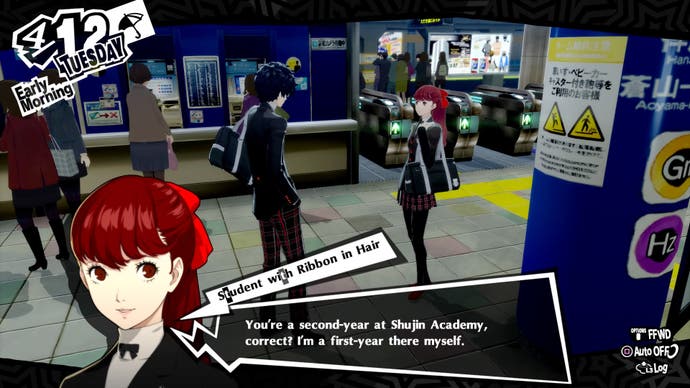
There's more stuff, but the important question is, does it make Persona 5, an already universally lauded game, any better? Honestly, and I'm making my best Robert DeNiro face while I say this: meh.
When I played the original Persona 5, a handful of things detracted from my overall immense enjoyment - the treatment of some of its characters, the difficulty, which to me felt pretty easy, and the length of the game. It wasn't just the number of hours, which was colossal, but how long they could feel.
If you're plugged into the discussion that surrounded Persona 5, you know that certain parts of its plot didn't land that well: a storyline in which your friend Ann is supposed to pose as a nude model, and a bit where your characters meet a couple of gay men. Atlus West requested the latter be changed, but to me it's an absolute non-change that while no longer suggesting the abduction of minors, still finds ample opportunity to stereotype gay men. Small mercies, I suppose.
The way Ann is treated is equally off-putting to me, but it's just part of your standard grab bag of misogyny in Japanese games, so of course that would remain unchanged. Don't get me wrong, I love Persona 5 a lot, and I recognise that the opportunity for change is limited if you don't want to downright cut content, but Royal does nothing to fix its larger problem: you get to meet a group of characters that's perfectly adorable in their own right, but it's constantly suggested they would be nothing without you.
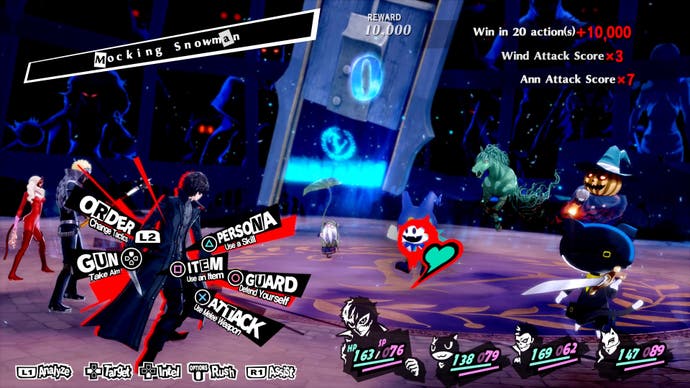
Persona 5 Royal puts its own characters down - it's frequently suggested that Ann is a bit of dumb blonde, Yusuke is just weird, Makoto is too uptight, but you're here to change their lives. P5R adds instances of queer-baiting to the mix, not letting you date your male team members, but putting you in intimate situations with them all the same. Persona 5 and Persona 5 Royal take the power fantasy to whole new levels, making sure to call the protagonist, and by extension the player, awe-inspiring, a hero, a leader, whenever the opportunity presents itself. I find the idea of being near-infallible pretty tiring.
This leads me to the combat. I'm confident in telling you to start Royal on Hard if you've played Persona 5 before. Royal also comes with two modes that lock you into your chosen difficulty, Safe and Merciless. You now have so many additional abilities and items that I think the standard game is way too easy, and can feel like going through the motions. Boss fights have been retooled with new segments to fit the narrative better, but the balance feels off - overall I enjoyed the fights, but I had trouble with some that had never bothered me before, while others seemed too easy given how far into the game I was.
The last point on my list however, is perhaps one of the most common complaints about Persona 5. I'm pretty happy how on normal difficulty there's never been a reason to mindlessly grind, even though in essence that's what Mementos is for. Grinding isn't what turns Persona 5 Royal into a game of over 100 hours - it's how characters review and re-review even the most basic information ad nauseum. It's how you might not want to spend the next four hours driving around in Mementos, but you have to, since it's a plot requirement. It's how the game heavily cheats you by suggesting not once, not twice but three times that this is definitely the last battle and the world will be saved any minute now.
The additions here make all of that worse. Absolutely no one I've ever talked to said "you know what Persona 5 needs? Another palace. And I also really want to spend more time in Mementos", yet that's exactly what you get. To make the plot additions work at all, it needs a massive leap of faith that undermines pretty much everything you've done until this point, and it's so frustrating. After a truly epic finale, another villain simply takes the place of the last. It's the same principle that often makes movie sequels so grating - the victory you've just had was for nothing. For a game that frequently tells you the exact opposite, to stay true to your ideals and keep fighting even when others think it's pointless, this is especially disheartening.
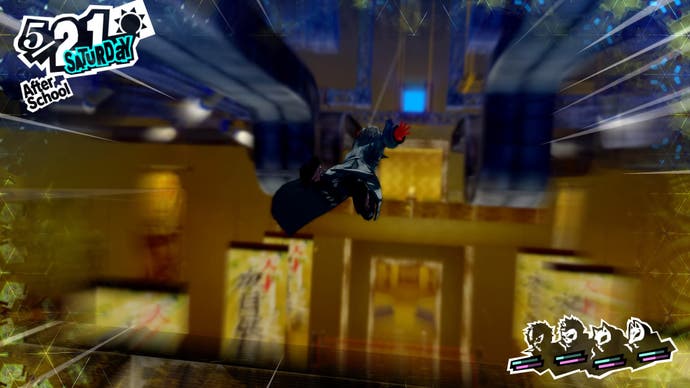
Without wanting to spoil anything, the new villain does have interesting motives, but they're the sole upside of a storyline that asks you twice to have the same conversation six times in a row, and that gives you a palace where you fight three new enemies over and over, one of them several consecutive times. The way it is, the new story content feels a bit tacked on, despite giving you the option to keep working on your Social Stats and links - it feels like a DLC. This is an additional month of in-game time, relating to something that's only alluded to in bits and pieces throughout the main game. It might be fun if you come back to Persona 5 after several months, but put at the end of the main storyline like that, it just makes you wait for it to be over.
If you've never played Persona 5, thanks to much of the optimisation this is certainly a safe bet. But Persona 5 Royal doesn't so much feel like a definitive edition and rather a game made for fans who get excited about collectibles like the Will Seeds or additional Persona, or who are thirsting for new interactions with characters like the twins, who were previously largely neglected. Sadly it doesn't add enough to justify another playthrough.
